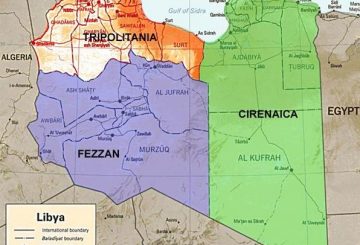The UN special envoy for Libya, Ghassan Salamé, arrived this morning at the Tamanhint airport (about 600 kilometers south of Tripoli), in the Fezzan region, on what is his first visit to the south of Libya from the beginning of her position in June of the 2017. The Italian news agency Nova reports it.
WE NEED YOUR HELP FOR INDEPENDENT INFORMATION "CLICK" AND DONATE TO PRP Channel 0,50 CENTESIMI ...Thank you!
This was reported by the UN Support Mission in Libya in a note on his Twitter profile. Upon arrival at Tamanhint airport, in the district of Sebha (capital of Fezzan), representatives of local authorities and security forces. Today, Salamé will meet with dignitaries, tribal leaders, academics and local activists in the province of Fezzan. In an interview published yesterday by the Panarabo newspaper published in London "Asharq al Awsat", Salamé revealed plans for the launch in the coming days of a UN mission to Benghazi and preparations for the launch of another UN mission in southern Libya.
The Fezzan
The analysis of the region made by Defense Analysis last March is very detailed. Fezzan is the crux of any attempt at normalization. Chad, a natural ally of the largest tribe, that of the Tebu (the "people of the rocks", a Saharan ethnic group of Ethiopian stock made up of about 200 individuals), is fighting a proxy war against Qatar and its Libyan allies linked to the Muslim Brotherhood . The Tebus inhabit southern Libya, northern Chad and northeastern Niger. They are allies of Haftar and after the fall of Gaddafi they took almost total control of the borders between Libya, Chad and Niger and between Libya and Sudan.

In Libya, Saudi Arabia instead held a fluctuating position, to the point of creating ambiguity that certainly did not help the start of a transition process: in the 2015 Riad had supported the Egyptian raids against Islamists supported by Qatar, but the deteriorating relations between Saudis and Egyptians has led Saudi Arabia to withdraw in part from the chessboard.
Since the liberation of Sirte and part of Benghazi from the Islamic State, the general situation has not improved at all. Indeed, the competition between the armed groups affiliated with Misrata and Tripoli is indicative of the deterioration of the climate of hope that for a very short time had illuminated the scenario.
Armed groups are also heavily involved in the violation of the arms embargo and the country remains an important crossroads for illicit arms flows to neighboring and non-African countries, as well as to the Middle East.
Only in the oil sector has a certain stabilization been achieved since the parties involved refrained from damaging the installations.
The control or at least the stabilization of Fezzan should be at the center of any international or national initiative, aimed not only at controlling the flows of migrants but also at combating illegal trafficking of all kinds and at efforts to stem the Islamic State in the Levant and in Africa in general.
The remote region of Fezzan is located at the junction with Algeria, Niger and Chad and offers opportunities for many lucrative situations for a plethora of actors, from local traffickers to Al Qaeda in the Islamic Maghreb (AQMI) and other jihadist groups.
The territory is also a major drug route, crossed by foreign mercenaries from sub-Saharan Africa, who initially tried to reach Sirte, and migrants coming mainly from Chad, Niger and other countries of the Sahel, but also from the Horn of Africa .
